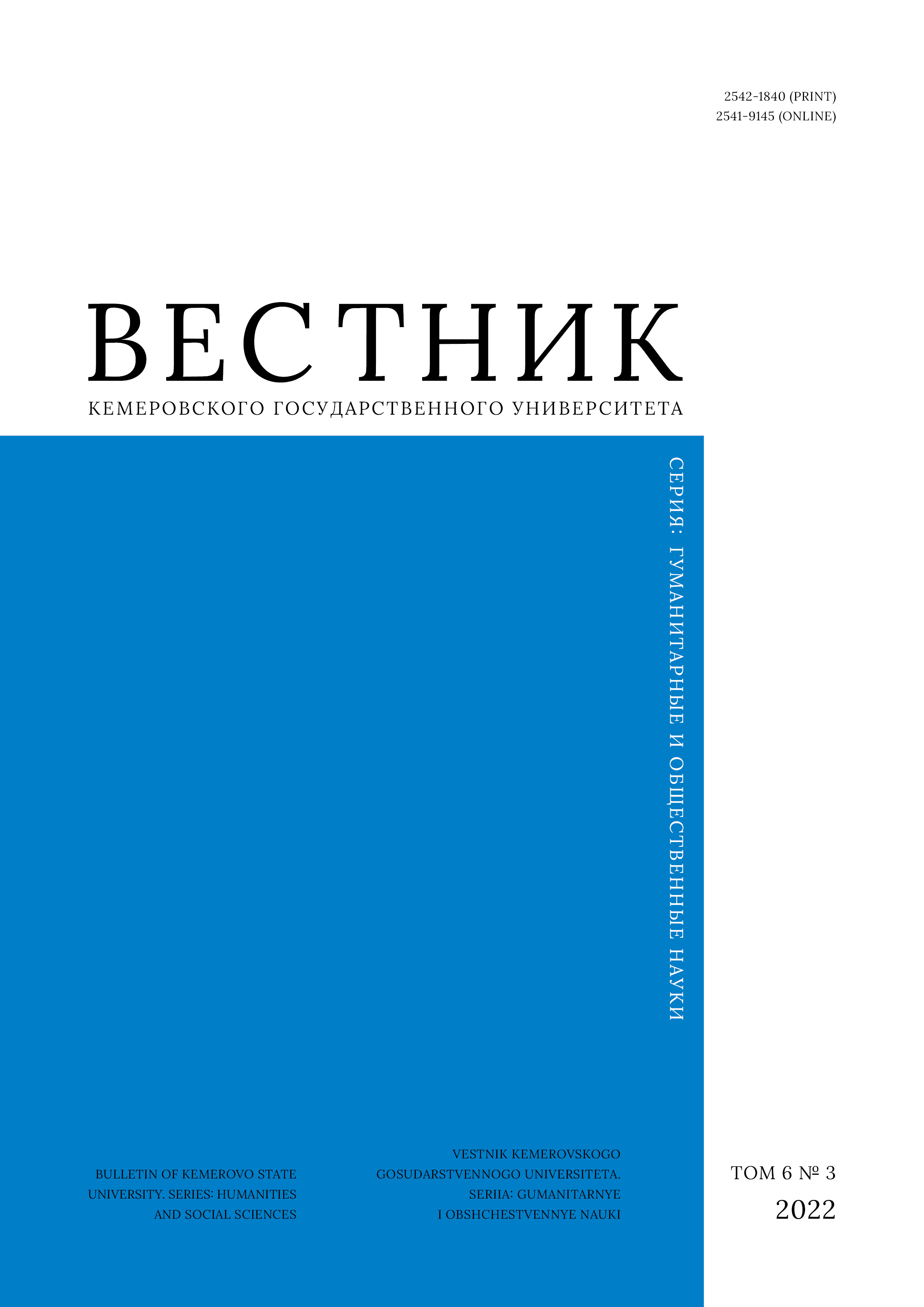Prokopyevsk, Russian Federation
Kuzbass mining managers have certain requirements for professional skills of future mining engineers. Along with theoretical and practical knowledge, they expect university graduates to possess professionally important personal qualities that allow mining engineers to work in potentially dangerous environment and bear responsibility for themselves and their team. Dual training is a form of social partnership between an educational institution and a large industrial enterprise. The article provides mechanisms for interaction between social partners and describes the possibilities of dual training as a means of developing professionally important personal qualities. The author reviewed foreign and Russian publications in the field of dual training and analyzed regulatory documents, requirements of mining managers, curricula of Mining university programs, personality characteristics of students of the practice-oriented specialties, and the socio-psychological climate at Kuzbass mining enterprises. The research resulted in an adjustment project for Mining majors and curricula developed by an expert group of university staff and mining enterprises.
dual training, mining engineer, professional competence, personal qualities, content variability, social partnership
1. Akhmedyanova G. F. Engineer competency as a result of constructive and technological teaching components. Fundamentalnye issledovaniia, 2011, (8-1): 13-16. (In Russ.)
2. Bay Yu. D., Denchuk D. S., Serebryakova E. N. Prospects for development of additional educational pathways in engineering universities through the example of elite engineering education NR TPU. Sovremennye naukoemkie tekhnologii, 2016, (5-3): 509-515. (In Russ.)
3. Bolotov V. A., Valdman I. A., Gorbovsky R. V., Zakhir Yu. S., Mertsalova T. A. Key issues in the development of national and regional systems of education quality assessment: a peer review. Moscow: HSE, 2016, 232. (In Russ.)
4. Morodenko E. V., Medovikova E. A. The analysis of the socio-psychological climate in the working staff of coal industry enterprises of Kemerovo region. Vestnik Kemerovskogo gosudarstvennogo universiteta, 2015, (2-1): 135-137. (In Russ.)
5. Abishev A. A., Vorobyov A. E., Murzayeva A. K. Dual technology of student training in the system of higher education of the Republic of Kazakhstan. Chelovek. Obshchestvo. Inkliuziia, 2017, (4): 92-102. (In Russ.)
6. Mukhametzyanova G. V., Aituganov I. M., Korchagin E. A., Matukhin E. L., Samoldina L. N., Safin R. S. Interaction of education and production: matter, models of realization. Kazan Pedagogical Journal, 2010, (3): 5-10. (In Russ.)
7. Zemlyansky V. V., Kanakin Ya. V. Theoretical aspects of dual target training of specialists. Voprosy sovremennoy nauki i praktiki. Universitet im. V. I. Vernadskogo, 2012, (1): 104-110. (In Russ.)
8. Greinert W.-D., Wolf S. Die Berufsschule - radikale Neuorientierung oder Abstieg zur Restschule? 2. Aufl. Berlin: Universitätsverlag der TU Berlin, 2013, 249.
9. Kutscha G. Bildung im Medium des Berufs? Ein kritisch-konstruktiver Beitrag zur Auseinandersetzung mit der bildungstheoretischen Grundlage der Berufs- und Wirtschaftspädagogik durch Herwig Blankertz unter besonderer Berücksichtigung neuerer Beiträge zur Theorie der beruflichen Bildung. Pädagogische Korrespondenz, 2011, 43: 65-83. https://doi.org/10.25656/01:8825
10. Schulz K. Das Duale System der Beruflichen Bildung in Deutschland. Darstellung und Kritik. Munich: GRIN Verlag GmbH, 2007, 64.
11. Kolga V. V., Shuvalova M. A. Modern models of dual education of technicians for high-tech industry. Sovremennye problemy nauki i obrazovaniia, 2015, (1-1). (In Russ.) URL: https://science-education.ru/ru/article/view?id=18103 (accessed 30 Mar 2022).
12. Shumakova O. V., Mozzherina T. G., Komarova S. Yu., Gavrilova N. V. Experience of dual training as an opportunity for increasing the proficiency of professional education. Elektronnyi nauchno-metodicheskii zhurnal Omskogo GAU, 2016, (4). (In Russ.) URL: http://e-journal.omgau.ru/index.php/2016-god/7/32-statya-2016-4/485-00230 (accessed 30 Mar 2022).
13. Kulay S. V., Kayachev G. F. Innovative model of practice-oriented training of employees of the town-forming enterprise in the mining region (by the Example of JSC "SUEK-Kuzbass"). E3S Web of Conferences: Proc. IInd Intern. Innovative Mining Symposium, Kemerovo, 20-22 Nov 2017. EDP Sciences, 2017, vol. 21. https://doi.org/10.1051/e3sconf/20172104029
14. Shadrin A. I. Integration education in the region: theory and practice. Krasnoyarsk: KSPU named after V. P. Astafiev, 2018, 218. (In Russ.)
15. Shaidullina A. R. Integration of secondary school, university and production in the regional system of vocational education. Dr. Ed. Sci. Diss. Kazan, 2010, 413. (In Russ.)
16. Ovsienko L. V., Zimina I. V., Esenina E. Yu. Dual training as an important factor in increasing the investment attractiveness of the region. Vestnik Kazanskogo tekhnologicheskogo universiteta, 2014, 17(5): 339-343. (In Russ.)
17. Grigoreva N. V., Mokretsova L. A., Shvets N. A. Technology of training specialists in dual education environment. Vestnik Tomskogo gosudarstvennogo pedagogicheskogo universiteta, 2018, (1): 109-115. (In Russ.) https://doi.org/10.23951/1609-624X-2018-1-109-115
18. Teshev V. A. Dual education as a factor in the modernization of the social partnership of universities and enterprises. Bulletin of Adyghe State University. Series "Regional Studies: Philosophy, History, Sociology, Jurisprudence, Political Science, Cultural Studies", 2014, (1): 144-150. (In Russ.)
19. Morodenko E. V., Medovikova E. A. Analysis of conflict issues at enterprises of the Kuzbass coal industry. Uchenye zapiski universiteta imeni P. F. Lesgafta, 2017, (4): 300-303. (In Russ.)
20. Morodenko E. V., Medovikova E. A. Psychological approach to the solution of the problem of increasing the safety of labour and health protection at the enterprises of the Kuzbass coal industry. Vestnik of Kostroma State University. Series: Pedagogy. Psychology. Sociokinetics, 2017, 23(3): 86-89. (In Russ.)
21. Denchuk D. S., Zamyatina O. M., Minin M. G., Sadchenko V. O. Analysis of engineering competencies in standards and programmes of engineering universities. Sovremennye problemy nauki i obrazovaniia, 2014, (6). (In Russ.) URL: https://science-education.ru/ru/article/view?id=16871 (accessed 30 Mar 2022).
22. Kuzin E. G. Methods of managing the result of education by forming feedback from students when setting open tasks. A new look at the education system: Proc. III Intern. Sci.-Prac. Conf., Prokopyevsk, 14-15 Apr 2021. Prokopyevsk: Prokopyevsk branch of KuzSTU, 2021, 70-74. (In Russ.)
23. Grigoreva N. V. Trajectory of professional growth as an instrument of specialist's professional competence in dual education environment. EurasiaScience: Proc. VII Intern. Sci.-Prac. Conf., Moscow, 31 Jan 2017. Moscow: Actualnost.RF, 2017, 63-66. (In Russ.)


















